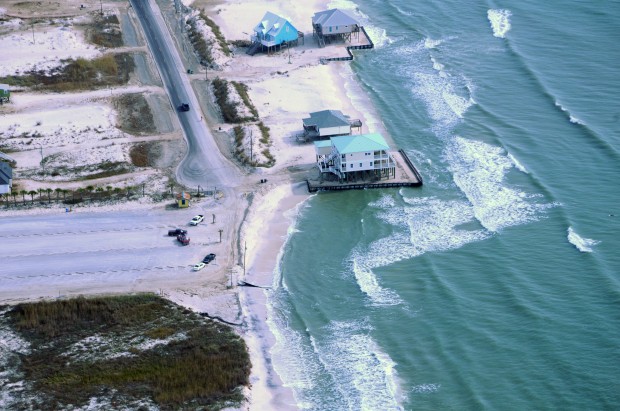The House at the End of the World
categories: Cocktail Hour
3 comments
 Take a good look at this photo—snapped last December by the marine biologist John Dindo on the west end of Dauphin Island, Alabama—and you can see almost everything that’s wrong about building homes along the coastline in this climate-changed, hurricane-prone, post-Sandy world. You can even make a game of it, if you want—sort of like one of those spot-the-error puzzles that you find on the children’s placemat menus at Red Robin. It’s easy to play along: Just print out the image and draw a big red circle around all the things that make no sense whatsoever.
Take a good look at this photo—snapped last December by the marine biologist John Dindo on the west end of Dauphin Island, Alabama—and you can see almost everything that’s wrong about building homes along the coastline in this climate-changed, hurricane-prone, post-Sandy world. You can even make a game of it, if you want—sort of like one of those spot-the-error puzzles that you find on the children’s placemat menus at Red Robin. It’s easy to play along: Just print out the image and draw a big red circle around all the things that make no sense whatsoever.
Here’s what I circled:
It’s obvious that this oversized house was built on an untenable spot. It’s practically asking to be flooded by the next major storm or taken out by the next hurricane. But what I’m really interested in is the owner’s second mistake—the one that ended up compounding the first one. In an attempt to protect his highly vulnerable castle, he has constructed his own private seawall around it. This seawall—which encircles, or rather ensquares, the house like a frontier fortification (and appears to be made out of Lincoln Logs)—is doing a good job, so far. The problem is that the job it’s doing isn’t one of protection: One look at the wall reveals that it wouldn’t stand a chance of holding back even a half-assed storm, let alone a full-on hurricane. No, what it’s doing instead is destroying the neighboring public beach.
To read more please go HERE.


Listen to the sea–wonderful line Dave. And the Robert Frost poem. So many individual marine-based ecological groups striving for notice and change. Coral reefs and narine floor damaged by fishing practices and human recreation are in need of rehabilitation. Dolphins dying from military sonar testing need protection. Sea turtle nests being disturbed by the public and the artificial lights of the human community are also in great distress. Beaches, the water, itself. And more and more. I wonder if there is enough of a political unity among the special interest groups, if they present together for a unified legislation to promote all things marine? It’s so difficult to inform and move masses of people into action. But maybe through a new (or revised) strong national campaign called Listen To The Sea…
(Make that Marine floor) 🙂
What a powerfully illuminating photograph – you don’t have to be an engineer to understand the folly of what’s being shown. It’s obvious the only question is not whether that house will succomb to the sea, but when. Is it just greed that allows these homes in the fall zone, or, as the author hints, romanticism, blind romanticism? Great last paragraph hammers the point, gently, almost like speaking softly with a big stick. (T. Roosevelt, another hero.). Well done!